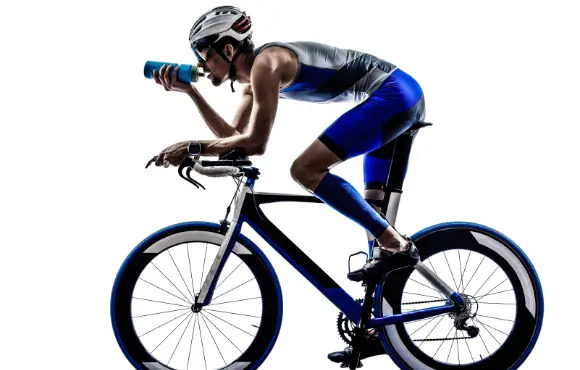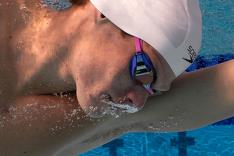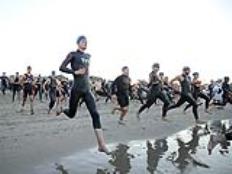While triathlon is great for the mind and body, it can also be damaging if not approached with a holistic--and realistic--mindset. Performance comes at a cost--but remember, a healthy triathlete is a happy triathlete.
Keep these ten rules in mind and you'll be swimming, biking and running for years to come.
Stress About Gear
1 of 11
With three sports to worry about, gear expenses can really add up. The $10,000 bike you bought last year might save you five minutes at your next race, but this year's model could save you six.
It's easy to get caught up in the never-ending cycle of new gear that promises better performance. News flash: The bikes the first IRONMAN competitors rode still got them to the finish line. While new gear has its advantages, sometimes it's best to just focus on the engine--you.
Track Every Workout
2 of 11
If that brick workout wasn't posted on Strava, it never happened, right? Wrong.
We live in a society where everything is documented. Sometimes, however, it's pleasant to just go for a run without technology or an online audience. Sure, it's nice to know your splits and look back in your training log, but just because you didn't charge your Garmin doesn't mean you can't hit the trails.
Neglect Seeing a Doctor
3 of 11
Triathlon is tough on the body. All that pavement pounding takes a toll on the knees, feet and lower back as time goes on. Minor aches and pains come with the territory, but don't ignore the signs of what could be a serious injury.
It may be inconvenient to see a doctor and miss a couple weeks of training while you rehab, but skipping the visit can lead to more serious injuries that sideline you for longer periods of time. And that's no fun.
Skip the Sunscreen
4 of 11
Training can reach upwards of 30 hours a week, and triathletes spend a great deal of time outside. You may look tan, healthy and fit, but be wary of the sun's harmful rays.
Triathletes are at a higher risk of skin cancer than most people, and prolonged exposure can also cause premature aging. Plan ahead, bring the appropriate SPF sunscreen and get regular checkups with your dermatologist to catch a potential problem early. No sunscreen-free century ride is worth the risk.
Set Too High of Expectations
5 of 11
Most triathletes have a Type A personality--they thrive off working hard and reaching lofty goals. When setting these goals, though, it's important to be smart.
If you finished your last IRONMAN in 13:30, shooting for 10:30 probably isn't realistic. You'll train too hard, risking injury and burn-out, and if you miss your goal, you'll be even more upset. Setting aggressive goals is great, but don't bite off more than you can chew.
Schedule an Inflexible Training Plan
6 of 11
Balancing swimming, biking and running can be tough. Throw in the occasional strength training workout or yoga session, and you may get overwhelmed.
While scheduling a training plan is a huge help, sometimes things come up that are out of your control. Missing a century ride or brick workout happens to the best of us. The most success comes from the ability to adapt your training schedule to your life schedule.
Miss Real-Life Events
7 of 11
Training for a triathlon requires dedication, regardless of the distance. Your social life is bound to take a hit when you go to bed at 8 p.m. after training all day, but landmark events should still be a priority.
Remember, triathlon will be here tomorrow. Your daughter's graduation won't. Ten years from now, you won't remember that day of training, but you will remember missing a milestone.
Skip Rest Days and Proper Recovery
8 of 11
It seems straightforward, but the more you train, the faster you become. While this may be true in theory, rest days are necessary to improve performance. They keep your body fresh and allow the endurance gains to take effect.
This holds true not only for your training schedule, but for nutrition and restorative methods as well. Considered the fourth sport of triathlon, proper nutrition is key for your body to recover properly. Also, stretching, icing and foam rolling shouldn't be skipped.
Run Someone Else's Race
9 of 11
Getting passed on the course can be a frustrating experience. A piece of advice? Let him or her go.
Unless you trained for a 7:30 mile pace, you won't be able to sustain that effort and you'll likely bonk by mile 10. Know your target pace and nutrition plan and execute your best race possible.
Forget to Have Fun
10 of 11
At the end of the day, triathlon is just swimming, biking and running--three things a 4-year-old can do. While you may not be having fun at the time, you always remember the race differently once you cross the finish line.
Smile, wave at family and friends and celebrate afterwards. For training, join a club and connect with other triathletes who share the same passion. Triathlon is meant to be a fun culture--don't take it too seriously.






Discuss This Article